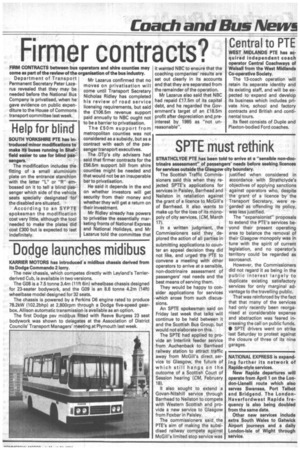SPTE must rethink
Page 19

If you've noticed an error in this article please click here to report it so we can fix it.
STRATHCLYDE PTE has been told to arrive at a "sensible non-doctrinaire assessment" of passengers' needs before seeking licences for services outside the Glasgow city boundary.
The Scottish Traffic Commissioners said this when they rejected SPTE's applications for services in Paisley, Barrhead and Neilston in retaliation against the grant of a licence to McGill's of Barrhead. It also wants to make up for the loss of its monopoly of city services. (CM, March
In a written judgment, the Commissioners said they deplored the action of all parties in submitting applications to counter an appeal decision they did not like, and urged the PTE to convene a meeting with other operators to arrive at a sensible, non-doctrinaire assessment of passengers' real needs and the best means of serving them.
They would be happy to consider applications for services which arose from such discussions.
An SPTE spokesman said on Friday last week that talks will continue to be held between it and the Scottish Bus Group, but would not elaborate on this.
The SPTE had applied to provide an Interlink feeder service from Auchenback to Barrhead railway station to attract traffic away from McGill's direct service to Glasgow, the future of which still hangs on the outcome of a Scottish Court of Session hearing (CM, February
It also sought to extend a Govan-Nitshill service through Barrhead to Neilston to compete with Western Scottish and provide a new service to Glasgow from Foxbar in Paisley.
The commissioners said the PTE's aim of making the subsidised railway compete against McGill's limited stop service was justified when considered in accordance with Strathclyde's objectives of applying sanctions against operators who, despite the grant of a licence by the Transport Secretary, were regarded as offending its policy, was less justified.
The "expansionist" proposals to extend the PTE's services beyond their present operating area to balance the removal of their Glasgow monopoly was in tune with the spirit of current legislation, and no operator's territory could be regarded as sacrosanct.
However, the Commissioners did not regard it as being in the public interest largely to duplicate existing satisfactory services for only marginal advantage to the travelling public.
That was reinforced by the fact that that many of the services had only recently been reorganised at considerable expense and abstraction was feared increasing the call on public funds.
• SPTE drivers went on strike last Saturday to protest against the closure of three of its nine garages.
























































































